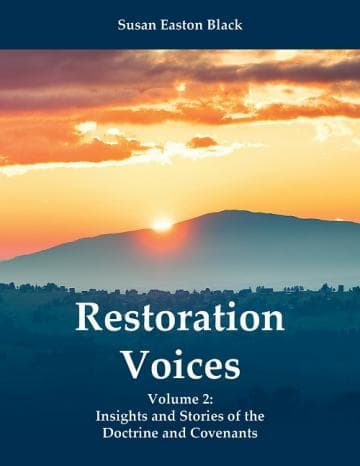Book
140 Chapters

As days of marching extended to weeks, an attack of infectious cholera spread from man to man in Zion’s camp. “The brethren were so violently attacked that it seemed impossible to render them any assistance,” wrote the Prophet Joseph Smith. “The Heavens seemed sealed against us and every power that could render us any assistance shut within its gates.”[1] When Joseph tried to halt the spreading plague, he “learned by painful experience that when the Great Jehovah decrees destruction upon any people, and makes known His determination, man must not attempt to stay his hand.”[2]
Sixty-eight men contracted cholera and thirteen died. As to how the cholera epidemic ended in camp, Brigham Young said:
President Joseph Smith called the members of the camp of Zion together, and told them if they would humble themselves before the Lord, and covenant that they would from that time forth obey his counsel, that the plague should be stopped from that very hour, and there would not be another case in camp, whereupon the brethren with uplifted hands covenanted that they would from that very hour hearken to his counsel and obey his word, and the plague was stayed according to the words of the Lord through his servant.[3]
When the cholera epidemic passed, the Prophet Joseph took Brigham Young into his confidence. He confided in him that the men who had marched with Zion’s Camp were not worthy to enter Jackson County. The Lord affirmed in a revelation to the Prophet Joseph on June 22, 1834, near Fishing River the unworthiness of the men in the camp. The Lord also revealed that the religious exiles of Jackson County had transgressed:
Behold, I say unto you, were it not for the transgressions of my people, speaking concerning the church and not individuals, they might have been redeemed even now.
But behold, they have not learned to be obedient to the things which I required at their hand, but are full of all manner of evil, and do not impart of their substance, as becometh saints, to the poor and afflicted among them. ...
Therefore, in consequences of the transgressions of my people, it is expedient in me that mine elders should wait for a little season for the redemption of Zion—For behold, I do not require at their hands to fight the battles of Zion; for, as I said in a former commandment, even so will I fulfill—I will fight your battles. (D&C 105: 2–3, 9, 14)
The men of Zion’s Camp had marched nearly eight hundred miles to redeem Zion and within a day of being in Zion, they were told to stop marching, for Zion would not be redeemed for a little season. They were also told the reason for not redeeming Zion had as much to do with their actions as it did the exiles of Jackson County.
On July 3, 1834, the men of Zion’s Camp were officially discharged by Lyman Wight as authorized by Joseph Smith.
Some questioned the value of Zion’s Camp. For Brigham Young, there were no questions. To him, the value of the camp was inestimable:
I have travelled with Joseph [Smith] a thousand miles, as he has led the Camp of Israel. I have watched him and observed every thing he said or did. ... I would not give the knowledge I got from Joseph from this Journey; and then you may take the State of Ohio and the United States, and I would not give that knowledge for them. It has done me good and you good and this was the starting point of my knowing how to lead Israel. I watched every word and summed it up, and I knew just as well how to lead this kingdom as I know the way to my own house. It is God within me, and God upon me; God by day and by night, and it is for His Kingdom on the earth.[4]
[1] Lucy Mack Smith, History, 1844–1845, Document Transcript, Bk. 13, 12.
[2] History, 1838–1856, volume A-1 [23 December 1805–30 August 1834], 505.
[3] History, 1838–1856, volume A-1 [23 December 1805–30 August 1834], 505.
[4] Salt Lake High Council Record, 1869–1872, 83–84, in Leonard J. Arrington, Brigham Young, American Moses, (Urbana and Chicago: University of Illinois Press, 1986), 45–46.
Book
140 Chapters
Items in the BMC Archive are made publicly available for non-commercial, private use. Inclusion within the BMC Archive does not imply endorsement. Items do not represent the official views of The Church of Jesus Christ of Latter-day Saints or of Book of Mormon Central.